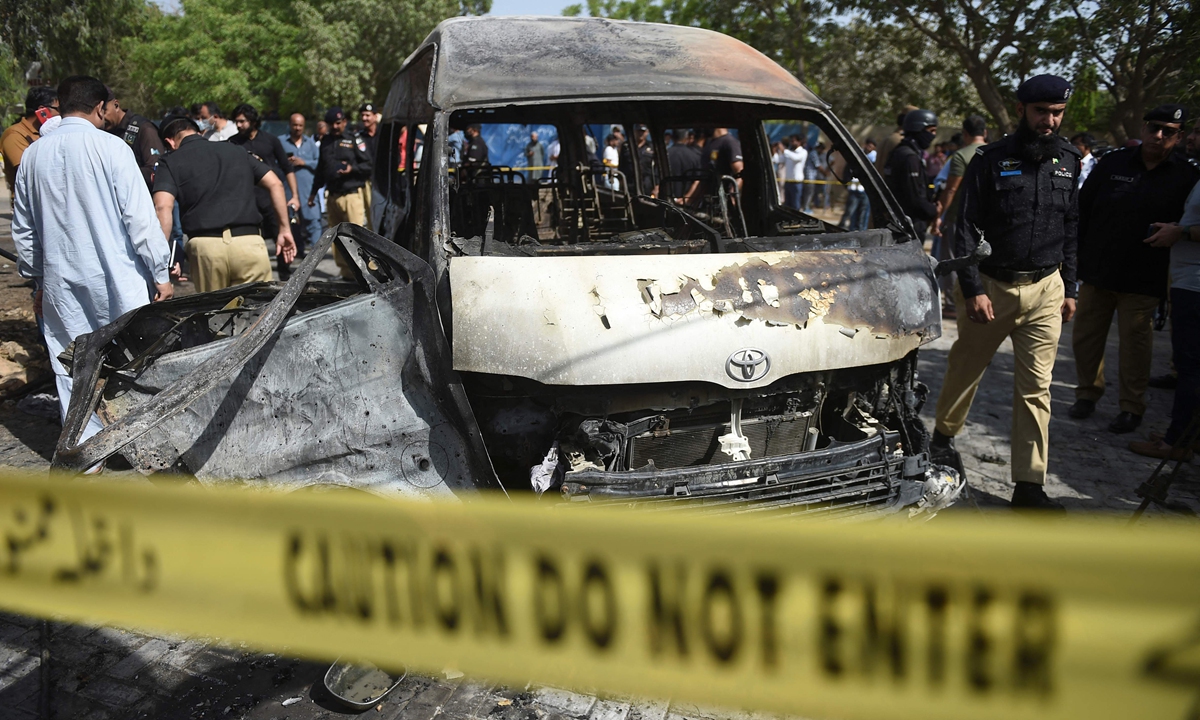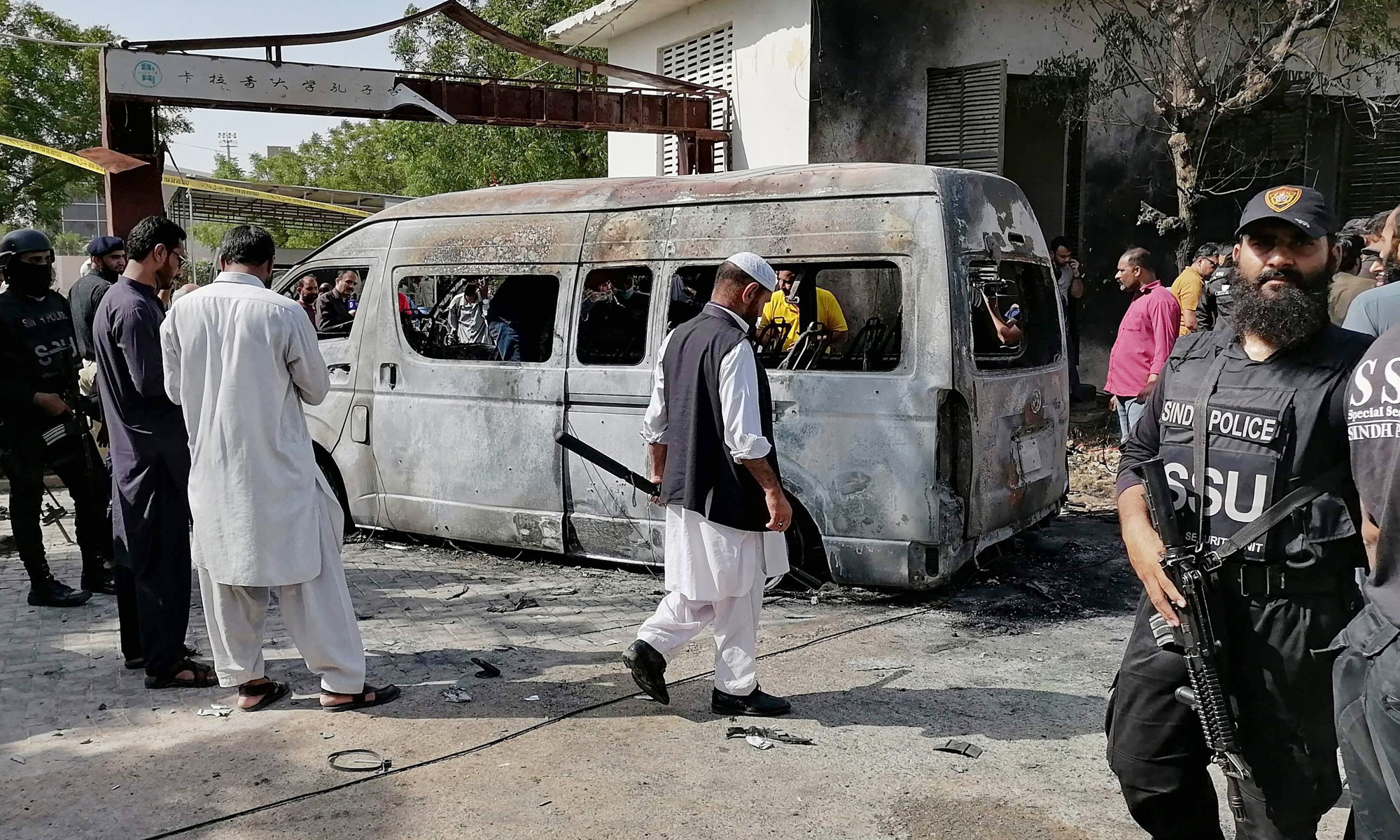
Police inspect a site around damaged vehicles following a suicide bombing near the Confucious Institute affiliated with the Karachi University, in Karachi on April 26, 2022. Photo:VCG
Three Chinese nationals and a local man were killed after what appeared to be a targeted suicide bombing in Karachi, Pakistan outside the University of Karachi's Confucius Institute on Tuesday afternoon local time.
The Chinese Foreign Ministry said in a statement that China strongly condemns and expresses great indignation over this major terrorist attack, conveys deep condolences to the victims and sympathies to the injured and bereaved families.
The Foreign Ministry and Chinese diplomatic missions in Pakistan will continue to urge relevant Pakistani departments to deal with the aftermath, treat the injured and resolutely crack down on the terrorist organizations involved.
"The blood of the Chinese people should not be shed in vain and those behind this incident will pay the price," the ministry said.
The Chinese Embassy in Islamabad condemned the terror attack and immediately launched its emergency response.
Pakistani Prime Minister Shehbaz Sharif paid a visit to the Chinese Embassy in the country's capital to express his condolences and vowed to bring the perpetrators to justice on Tuesday afternoon, hours after the deadly blast.
Around 2:20 pm on Tuesday, there was a terror attack against the shuttle bus used by Karachi's Confucius Institute, killing three Chinese teachers and their local driver, and injuring one, according to a release from the Chinese Embassy in Pakistan.
According to a letter the Global Times acquired on Sharif's message of condolence, the Pakistani prime minister said he has instructed the matter to be thoroughly investigated and the perpetrators brought to justice and he vowed to "extend all possible assistance to the injured."
"Pakistan condemns terrorism in all its forms and manifestations," said Sharif. "The nefarious designs of the enemies of Pakistan-China Strategic Cooperative Partnership will neither dent our Iron Brotherhood nor impact our cooperation."
The Chinese International Education Foundation, which is in charge of running the Confucius Institutes, released a statement on Tuesday, strongly condemning the terror attack and sending condolences to the victims. It called on all Confucius Institutes to ensure the safety of staff amid current complicate international situations.
According to a surveillance video footage, as the van slowed to turn into an entrance to the institue from a road, it suddenly exploded and burst into flames.
The Tuesday tragedy happened less than a year after the Dasu attack. On the morning of July 14, 2021, nine Chinese nationals and three Pakistanis were killed in a shuttle bus explosion in north Pakistan on their way to the China-invested Dasu hydropower project. In August, Pakistan released its preliminary investigation results, saying that that a branch of the Pakistani Taliban was responsible for the Dasu terror attack.
Soon after the blast, the Chinese Embassy condemned the terror attack in a release and sent deep condolence to the victims. It also launched an emergency response and requested Pakistan to take effective measures to ensure the security of Chinese citizens and Chinese companies and make sure that similar accidents would not happen again.

Police inspect a site around a damaged vehicle following a suicide bombing near the Confucius Institute affiliated with the Karachi University, in Karachi on April 26, 2022. A woman suicide bomber from a Pakistan separatist group killed four people, including three Chinese nationals, in an attack on a vehicle carrying staff from the Confucius Institute affiliated with the Karachi University. Photo: AFP
Who is perpetrator? Soon after the explosion, the Baloch Liberation Army (BLA), a militant separatist group, announced responsibility. Experts said that given the capability and willingness, the BLA is the biggest suspect but the Pakistan Taliban, IS or the "East Turkistan Islamic Movement" could also be involved.
The BLA is one of the largest terror groups currently active in Baluchistan Province, southwest Pakistan, and it has carried out repeated attacks against Chinese targets, Qian Feng, director of the research department at the National Strategy Institute at Tsinghua University, told the Global Times.
"Karachi, where the attack took place, is the largest city in Pakistan, and it would be easy for the BLA to infiltrate the city," said Qian, noting that it is extremely difficult to prevent terror attacks launched by this organization, especially those against individuals.
The BLA has already targeted Chinese nationals and Chinese government projects in Pakistan. In May 2017, 10 workers were killed by two gunmen on motorbikes, which the BLA claimed was a response to the development of the China-Pakistan Economic Corridor (CPEC).
In 2018, the group also attacked the Chinese Consulate-General in Karachi in south Pakistan, during which two police officers were killed. In August 2021, two children were killed and three were wounded in an attack targeting Chinese nationals in the port of Gwadar, Pakistan.
"Judging from the surveillance footage, the attack is a suicide bombing," Li Wei, an expert on national security at the China Institute of Contemporary International Relations, told the Global Times on Tuesday, noting this could be the upgrade from the usual roadside bombing tactics used by the BLA.
Before 2021, the BLA used more roadside bombs to launch terror attacks. But since then, the BLA has refined their attack methods, including the use of children as suicide bombers, Li said, noting that "this is probably because they were supported by other parties."
There is much speculation on who is behind the BLA but scant hard evidence. Indian newspaper The Hindu reported that BLA commanders in the past had sought medical treatment in India's hospitals, often under disguise.
The BLA, especially the Majeed Brigade, has close contact with India but it is hard to judge whether these are official not. But without Indian travel permits, the Majeed Brigade head's visits to India would not be possible, Wang Shida, deputy director of the South Asia, Southeast Asia and Oceania Research Institute of Contemporary International Relations Research Academy of China, told the Global Times.
Qian believes the terrorist attack on Chinese citizens is unlikely to be connected to the recent political changes in Pakistan. While there have been some protests since the change of leadership, the situation has not gotten out of hand.
The root cause of this terrorist attack is that the soil for the growth of terrorism and religious extremism in Pakistan has not been removed, and the environment in which terrorism thrives has always existed, said Qian.
Many terrorist organizations are supported by third parties around the globe or even some international terrorist organizations, which is one of the reasons why they continue to survive under the siege and suppression and strikes of the Pakistani military, Qian noted.
Targeting CPEC?As the CPEC has entered a critical period, some separatist and extreme forces, who think the CPEC is an achievement of the Pakistan government which will be to the detriment of their desire for independence, hold an increasingly hostile attitude toward projects connected with it, Zhu Yongbiao, director of the Center for Afghanistan Studies in Lanzhou University, told the Global Times on Tuesday.
The CPEC runs through areas with complicated disputes among different religious groups and ethnic groups with their own complex political and economic interests, Zhu said.
Moreover, the US' withdrawal from Afghanistan last year has greatly affected the security situation in South Asia. Since last year, attacks increased in Pakistan and attacks targeting Chinese people and companies also increased. The terrorist forces in Pakistan have been encouraged and united, which worsens the security situation in the country, said Zhu.
The Chinese Embassy on Tuesday also reminded Chinese citizens, companies and projects to pay close attention to the security situation in Pakistan, improve security measures and not to go outside unless necessary.
Pakistan stepped up its protection of CPEC projects, especially after the Dasu attack last year. However, the protection of "soft targets" like the Confucius Institute at the University of Karachi is far less than that of other projects. Meanwhile, the terrorist organizations chose female suicide bombers, which is not easy to guard against, analysts said.
An executive of a Chinese state-owned company, which has wide investment in Pakistan, told the Global Times on condition of anonymity on Tuesday that its projects in Pakistan have "very strict security standards," without elaborating on detailed measures.
In the wake of the Tuesday attack, China State Construction launched a security review, not only into goods and products, but also technologies and relevant personnel, and the company's institutions and projects in Pakistan are safe, a company spokesperson told the Global Times on Tuesday.
The company will upgrade its security to ensure the safety of employees, the spokesperson said, adding that the firm prioritizes the safety and health of Chinese employees.
China State Construction has invested in a number of flagship projects under the China-proposed Belt and Road Initiative, including the Peshawar-Karachi Motorway, the largest transportation infrastructure project under the China-Pakistan Economic Corridor.





